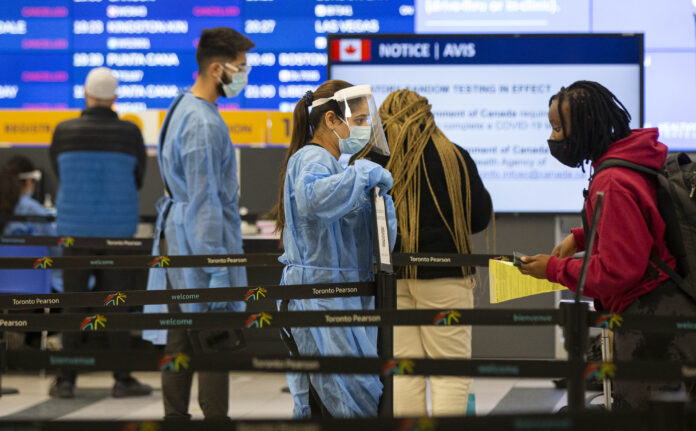Canada is scrapping its pre-arrival COVID-19 testing requirement for fully vaccinated travellers, the federal government announced on Thursday.
Starting April 1, vaccinated travellers won’t need to track down a COVID-19 test in the last day before their vacation ends.
Currently, all travellers entering Canada — regardless of vaccination status — have to show proof of a negative COVID-19 antigen test, taken within 24 hours of their flight or arrival at Canada’s border.
As an alternative, they can show proof of a negative PCR test from within the previous 72 hours.
But starting next month, travellers who are fully vaccinated won’t have to show either. That’s good news for the border town businesses and families who have been pushing for a change to the testing rules.
The change “will allow border businesses, like land border duty free stores, to get on the road to recovery,” the Frontier Duty Free Association wrote in a press release on Wednesday.
“This could not be more welcomed news.”
Travel industry, tourists welcome elimination of COVID-19 testing to enter Canada
Jessica Herries, a Canadian mother from Niagara Falls, Ont., says she has had to spend “thousands of dollars” on COVID-19 tests over the course over the pandemic. All this, she said, to see family that lives a 30-minute drive away in Buffalo, N.Y. — despite everyone being fully vaccinated.
There are a number of stories that echo the one Herries has lived, according to Faces of Advocacy, an organization dedicated to reunifying families separated by the border rules.
“This is welcome news to thousands of Canadian families who have disproportionately suffered from travel rules that have harmed loved ones emotionally and financially over the past two years,” the organization wrote in a press release Thursday morning.
Trending Stories
British businessman killed execution-style near Mexico’s Playa del Carmen
Hollywood celebrities call on RBC to stop financing B.C.’s Coastal GasLink project
As the spread of COVID-19 in Canada slowed in recent weeks, federal and provincial governments have been gradually lifting a number of restrictions.
At the end of February, Duclos said travellers coming to Canada could present a negative rapid-antigen test rather than an expensive and time-consuming molecular test. At the time, he hinted more restrictions could be lifted — provided COVID-19 cases continue to trend in the right direction.
There are more than 115,000 positive COVID-19 cases in Canada right now, and more than 13 per cent of tests taken are coming back positive — a number that suggests many cases are going undocumented in Canadian communities, infectious disease specialists have warned.
Globally, meanwhile, cases are on the rise again. Compared with the week prior, new infections jumped by eight per cent around the world — with 11 million new cases and just over 43,000 new deaths reported from March 7 to 13, the WHO said Wednesday.
That’s the first increase in cases since the end of January.
Experts have begun to warn that more countries could soon see a similar wave to that seen in Europe, potentially driven by the BA.2 variant, the lifting of restrictions and potential waning immunity from vaccines given several months ago.
With the BA.2 variant — a subvariant of Omicron — circulating, medical experts are eyeing some decisions to lift restrictions with a measure of skepticism.
Border cities ‘relieved,’ expecting increase in tourism with feds expected to drop pre-arrival testing
Dr. Gerald Evans, a professor at Queen’s University who specializes in infectious diseases, says masking and capacity limits should remain in place until the full impact of BA.2 is known.
“I think it’s just been rushed a little bit too quickly,” he told Global News on Wednesday. “If we’re not quick to reduce restrictions … we could probably keep that BA.2 wave down a little bit.”
However, others said that if cases are down right now, it’s worth giving Canadians a break.
“For all we know, this is a temporary ceasefire in the pandemic,” said Kerry Bowman, a bioethicist and assistant professor at the University of Toronto.
“If it is, then we all need a break and we should have that break. But if there is a need for restrictions in the future, they need to make sense for that future moment, not for what worked six months ago.”
— with files from Global News’ Twinkle Ghosh, Aya Al-Hakim and Sean Boynton.
© 2022 Global News, a division of Corus Entertainment Inc.



